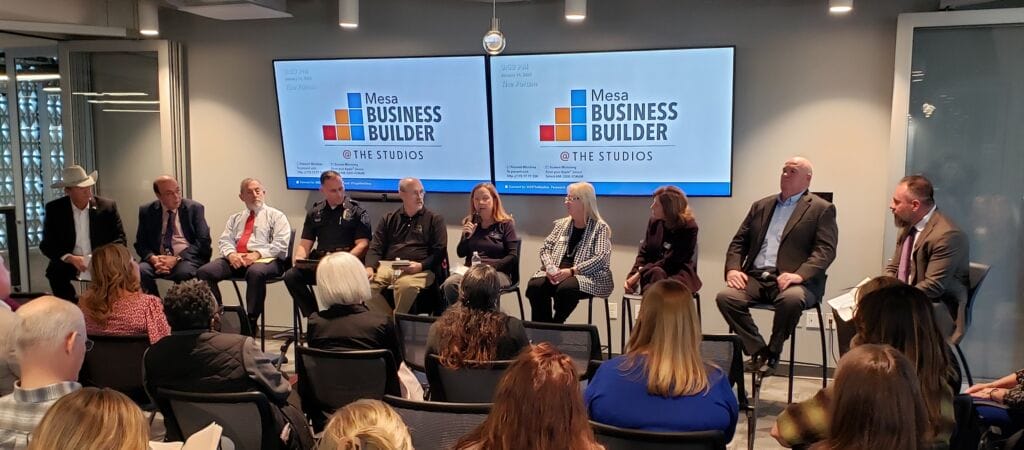Community Action Partnership: Homelessness in Mesa

CAP, January 14 – Town Hall Forum on Homelessness
The Mesa Chamber Community Action Partnership hosted a town hall focused on Mesa’s homelessness issues.
Moderated by CAP co-chair David Scott, the panel included government officials including Mayor Mark Freeman; Councilman Rich Adams; and Mesa PD Assistant Chief Dan Butler. They were joined by representatives of various local nonprofits including Mike Hughes, CEO of A New Leaf; Robyn Julien, CEO of Save the Family; Kayla Kolar, CEO of House of Refuge, and Executive Director of La Mesa Ministries Rick McClellan and Pastor Luis Amaya of Iglesia de Cristo Elim Betel Church.
The nonprofit leaders were asked to paint the picture of the homeless population, and it goes beyond the person sleeping in the park or poised on the street. “We call many of the people we encounter the ‘hidden homeless,’” said Kolar. “They may be living in their cars, or couch surfing at a friend’s, and they’re just trying to get by.”
Julien agreed, saying many families are just one missed paycheck away from eviction.
La Mesa Ministries estimated they see 300-350 people/week for services, with the biggest group increase being seniors and disabled. They all agreed that nonprofits being together for this event puts them ahead of other communities, which have not attempted collaboration to this extent. “We can’t be silos – we have to work together,” Hughes said.
City services including law enforcement are usually the first contact people have to either report homeless situations or encounter assistance. Mesa police refer to other city and private organizations to help. Assistant Chief Butler estimated they receive 300,000 calls related to homelessness, or about 600-700 each month.
Unfortunately, there is a low acceptance rate (20%) receiving help, although some referred to community court, Community Bridges. Currently, the department has 4 stations, and 2 full-time officers committed to homeless issues, along with 2 full-time squads, often focused on mental illness. Across the department 30 full-time staff working on the issue.
Currently, the trend has been larger families coming in, as older children are returning home after struggling with rising rents. The challenge all of the nonprofits are facing is resources dwindling, particularly as COVID funds dry up.
Councilman Adams offered some positive news, saying that the cooperative attitude and interest helps put Mesa forward in comparison to other cities. He also felt there are things the City can do to “facilitate v regulate” when it comes to promoting development, including backyard rentals. “We don’t want to become a community of renters,” he cautioned. ”That equates to a lack of investment; we have to reestablish the American dream of home ownership. The answers are tough, so collaboration is key to getting to the answers. Trouble is in balancing private property owners concerns while also allowing for their neighbors to offer multi-unit housing,” he added.
Mayor Freeman agreed, saying, “The middle ground of housing has been missing, so we need to work to cut the red tape and make sure the right development occurs to provide a safe place to live and work.”
He also spoke to the challenges of income and offered insight into increasing wages through education. “Wages haven’t caught up with rents, so education should also focus on career readiness.”
There are bright spots and success stories amidst the challenges. Kolar talked about the positive outcomes families have experienced by coming to House of Refuge. The former army installation on Williams Field Road sees 88 families each year – 85% of whom are single moms, with ⅓ in domestic violence situations. Their wrap-around services include job search training, financial counseling, and other supportive classes that have allowed families to buy a car, get a better job, and become independent again.
On Mesa’s west side, Eden Village is developing tiny homes that can be rented for $400 per month by residents with a maximum income of $1000/month. This community is geared toward the chronically homeless and disabled and is located on University Dr. between Dobson & Alma School. The residents, because of their shared stories, no longer feel like they are alone or judged by the larger community.
While no one can expect one meeting to solve every issue, the takeaway was that continued collaboration and communication can stem the tide. Sharing resources and bringing services to anyone who needs them can draw us one step closer to building back independence and dignity for the homeless among us
Summary provided by: Denise Konkol
Denise Konkol is a Chamber member, assisting clients as a writer, and a financial literacy coach with Ramsey Solutions.
.
